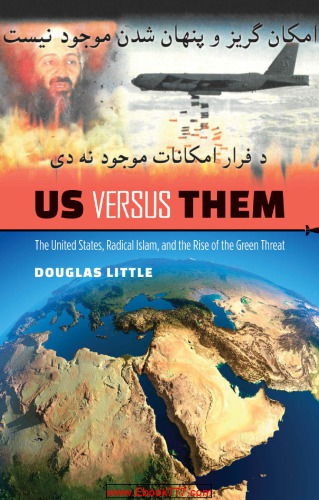Product desciption
Us Versus Them The United States Radical Islam And The Rise Of The Green Threat Douglas Little by Douglas Little 9781469626802, 9781469626819, 1469626802, 1469626810 instant download after payment.
In this important new book, Douglas Little explores the political and cultural turmoil that led U.S. policy makers to shift their attention from containing the "Red Threat" of international communism to combating the "Green Threat" of radical Islam after 1989. Little analyzes America's confrontation with Islamic extremism through the traditional ideological framework of "us versus them" that has historically pitted the United States against Native Americans, Mexicans, Asian immigrants, Nazis, and the Soviets.
The collapse of the Soviet Union seemed to signal that the doctrine of containment had served U.S. interests in the Middle East well, preserving Western access to Persian Gulf oil while protecting Israel and preventing communist subversion. Yet, although many Americans hoped that the end of the Cold War would enable the United States to redefine its diplomatic relationships in the Middle East and elsewhere, Little demonstrates that from Operation Desert Storm in 1991 to America's battle against ISIS today, U.S. foreign policy has been governed by "us versus them" thinking, with Islamophobia supplanting the threats of yesteryear.
Reviews
Shows the links between this era and attitudes evident at the time of the Native American removal, the fears of African Americans, immigrants, the so-called 'yellow peril' of the wartime years, through Cold War communism to the current predicament.--International Affairs
Little accurately captures, first, the United States' relations with the Islamic world, and second, the transfer of a reflexive, and to a larger extent unavoidable, polarized paradigm for the conduct of US foreign policy.--Glenn L. Carle, Middle East Journal
Douglas Little's cogent, perceptive, and well-reasoned work emerges as one of the best books on recent U.S. diplomacy across the Middle East. Moving energetically through twenty-five years of U.S. diplomacy, Little's compelling and memorable thesis will draw more visibility and attention to his work than that enjoyed to date by any other book on this subject.--Peter Hahn, Ohio State University
Us versus Them is a marvelous read on a hot topic. With crisp and witty prose, the book is by far the liveliest read in its field, and Little demonstrates a mastery of sources with the sure hand of a mature historian who knows not only the topic of U.S. relations with the Middle East, but also the broad sweep of U.S. history. No book presently on the market commands the strengths of Us versus Them.--Frank Costigliola, University of Connecticut


